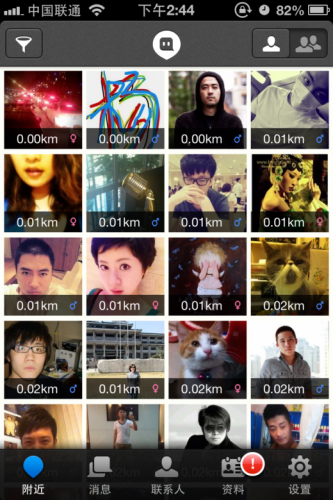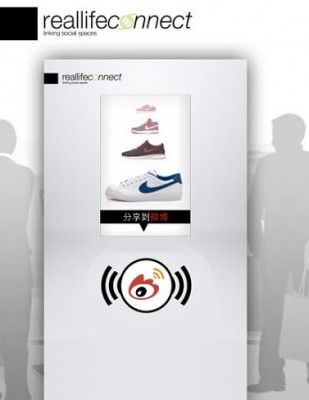We Are Social Asia Tuesday TuneUp #52
Momo in a SoLoMo dating world
Online dating services are big and have evolved rapidly. Last week, we mentioned that Indian website Shaadi.com was the most engaging brand on Facebook. This week, a report by The Next Web looks at the evolution of online dating services in China. Moving on from scouring online profiles in the hopes of meeting “The One”, social networking app Momo allows users to meet new people who are nearby, meetings powered by the confluence of social networking, location-based and mobile services. The service is barely over a year old and has attracted 16 million users, of which 6 million signed up within the past 2 months. Though the service has a reputation for enabling easy hookups between young people (the average user is around 25 years of age), the company says it was created for a loftier purpose of allowing Chinese urban dwellers to make friends with their neighbours in an increasingly disengaged world. Momo doesn’t see themselves as a competitor to Tencent’s WeChat, which has a similar feature allowing its users to meet strangers, claiming that the 2 apps function on different levels. There are plans to release an English-language version, complete with Facebook integration, in an effort to make headway into the international market.
Singapore-based Sprooki to expand into the Philippines next
Singapore-born location-based mobile commerce platform Sprooki announced that it has secured S$590,000 in seed funding. Comprising a lean team of 8, Sprooki has over 60 mall and retail partners within Asia and Singapore for their services, which enable retail shops to send targeted messages and promotions to potential customers milling close by. Having recently appointed a representative in Manila, Sprooki is also exploring opportunities in Australia.
RealLifeConnect adds Sina Weibo support for social media check-in stations
“Offline social media” sharing is now available in China through Austrian startup RealLifeConnect’s check-in stations with support for Sina Weibo. The RFID/NFC-equipped check-in terminals allow users to share from stands at events, exhibitions or stores without needing to use their own smartphones. Brands or event organizers can benefit from the service by giving out free cards or tokens at events, thereby allowing recipients to talk about them easily on Weibo. Variations of RealLifeConnect’s social media check-in stations allow users to transfer files or contact details via NFC or RFID, giving the platform more flexibility in application. The company shared that it has seen 50 successful cases through the application of its platform across 5 continents within the past 10 months and is now looking to expand globally.
@WeAreMumbai is India’s first rotational curation Twitter account
India is making another mark in Twitterverse with it’s first rotational curation account @WeAreMumbai, which is managed weekly by a new tweep from Mumbai. The curator recommends things to do and places to see in addition to sharing opinions and ideas for 7 days. The account has gained 848 followers within a space of 3 weeks and received positive feedback. During its first week, the hashtag #WeAreMumbaiQuiz trended in India for 6 hours with 350+ mentions and increasing follower numbers by 150. The account has attracted the attention and following of influential Twitter users within Mumbai and looks set to grow significantly as users get wind of its existence.
More UK businesses adapting to social
A new survey from the Internet Advertising Bureau has found that 55% of UK business execs are changing their company’s strategy to be more social. While this figure is now firmly in the territory of the majority, the more worrying find from this report is that 45% haven’t made any changes at all, mostly because of a lack of confidence, education and training in the area. Also frightening is the fact that just 45% of companies are using social media to raise brand awareness, and an even smaller fraction (28%) are using it to actually interact with customers.
Facebook’s revenue on the rise
Facebook has reported $1.2 billion in revenue for the third quarter, up from $954 million from this time last year, beating analysts’ expectations and sending Facebook’s share price soaring. The lion’s share of Facebook’s revenue came from advertising, which has grown steadily since 2011.

Facebook hit 1 billion users just over a month ago, and its biggest growth has been in Asia, especially Japan, which had a 216% increase in users in the last year. The number of monthly active users in the US and Europe has also increased since the last quarter, though those markets have slowed down now.

Facebook Mobile is marching toward widespread adoption and has now crossed the halfway point in terms of number of users. About 600 million people access Facebook via their phones every month, a 61% increase since last year. The company reported that 14% of its ad revenue came from mobile this past quarter.

Brands see up to 5x more reach with Facebook ads
It’s no surprise that brands that pay to run advertising on Facebook are seen by more users, especially with the recent changes to Facebook’s EdgeRank algorithm. But how many more users see these posts exactly? Facebook investigated the top 100 brand pages by fan base and found that using paid-for ads exposed the page to five times as many people. The reach of a single post is amplified more than 100%, and the reach of all page posts from that week increased significantly as well. The study also found that these new fans love to shop more than the average internet user, both online and in store, and are more engaged with the brand and the category. Amazing content can go a long way, but paying to have it pushed up the newsfeed seems to go even further.

Twitter introduces gender targeting for Promoted Products
With Twitter’s simple profile, it’s not always easy to tell the guys from the girls based on a simple bio, but Twitter is trying to do just that to make it easier for marketers to target their campaigns on Twitter by gender. However, Twitter isn’t adding this option to users’ profiles, but instead it’s looking at “signals” in users’ tweets, such as their account name and who they follow, similar to what it uses for interest targeting. And when gender can’t be determined, those users will not be exposed to the ads. Twitter has said that its predictions were found to be 90% accurate in tests.
More than 2,000 brands now have ‘expanded tweets’
Twitter has announced that it now has more than 2,000 partner sites on board for Twitter Cards, which expand tweets to include more of a description of the linked content, as well as interactive media. The potential for this is huge, and Twitter might be headed down the right trail to monetization if it can take a slice of sales from tweets.

Pinterest motivates more online shopping than Facebook
A new study has found that Pinterest is one of the top online destinations for online shoppers looking to browse, easily topping Facebook in terms of engagement and where Internet users go to keep up on the latest trends. 70% of respondents said that they turn to Pinterest to get inspiration on what to buy, with just 17% saying they used Facebook for that. More Internet users also said they are more likely to follow a brand on Pinterest to get special offers compared to liking them on Facebook.

In other news, Pinterest users can now verify their website on their profile page, similar to Twitter’s verified accounts. But unlike Twitter, Pinterest users can request verification themselves, and when approved, a red circle with a checkmark will appear next to their site name.
Yelp buys Qype for $50 million
If you can’t beat ‘em, buy ‘em. That’s the latest from Yelp’s biggest European rival Qype, which Yelp has just purchased, as it looks to grow in Europe and become a stronger competitor to Google. Earlier this year, Qype soared ahead of Yelp in terms of the number of places reviewed in Europe, which stood at 860,000, so it looks like this is a good deal for Yelp’s expansion.
Romney’s Facebook app finds your most influential friends in the election
If you’re stuck in a heavy red or blue state for the presidential election, a new Facebook app created by presidential hopeful Mitt Romney’s team will find your Facebook friends who are most likely to have sway in the election and lets you sway them with a private message or a post on their wall. But will taking a stance on social media change your friends’ minds? Nearly 20% of social media users say they block friends who spout off about politics on their pages, even though 2010 saw a 2% increase in voter turnout, a boost thanks to political messages sent on Facebook.

Tesco Wine and Topshop reveal campaigns to celebrate Halloween
Halloween might be on Wednesday, but that doesn’t mean there won’t be a party. To celebrate, We Are Social developed the #HalloWine hashtag to get Tesco Wine’s followers in the Halloween spirit with the chance to win a few bottles. Topshop is also using a dedicated hashtag and is asking its followers to submit photos of their Halloween costumes using #TrickorTweet to win in-store goodies. Followers can present their tweets to staff at special ‘tweet shops’ in selected stores, where they will get to take home free cosmetic products. The shop is rewarding the best daily photos with £100 gift cards.
New campaign asks Facebook users to ‘Like’ the rainforest to save it
Coffee company Kenco has created a new campaign that vows to protect a square meter of Colombian rainforest for every ‘Like’ it gets on its Facebook page. Facebook fans can return to the page to see how their area of the rainforest has grown over time, as the Likes keep pouring in.

We Are Social appointed to accounts for Evian, Volvic and Badoit
We’re incredibly thrilled to be starting work with three fantastic bottled water brands that have taken the plunge into social media. We Are Social has been appointed to work with Evian, Volvic and Badoit. Watch this space for our work with them as it goes live.
Tweet your composition to save Amsterdam’s orchestra
Amsterdam’s Metropole Orchestra could be on its last strings because of cuts to public broadcasting in the Netherlands. In an attempt to save it, they’ve paired Twitter with a digital piano interface and asked fans to tweet their compositions. The orchestra will select and perform the most interesting Twitter songs and play them in a live broadcast from the studio.

Foursquare drops new badges for Halloween and two UK exclusives
Cheers, Foursquare: In the last week, the social check-in platform announced two new badges available only in the UK that celebrate the country’s two favorite drinking occasions: the after-work pint and the afternoon high tea. Sounds like the perfect excuse to cram both events into the same day. Foursquare has also released three new badges for Halloween, including a standard 2012 pumpkin and a special spooky swarm.




